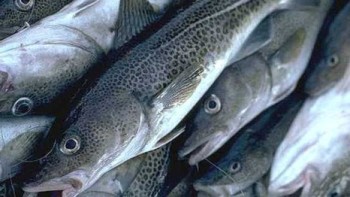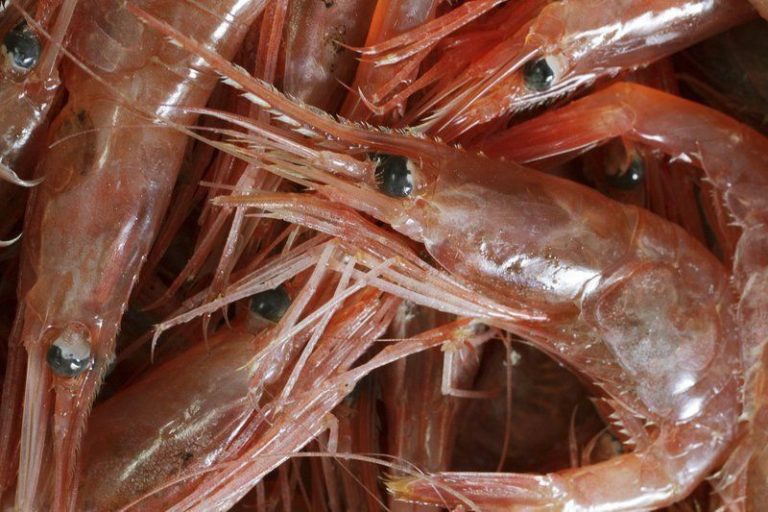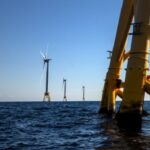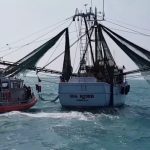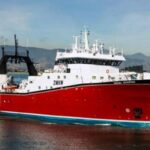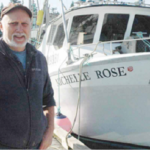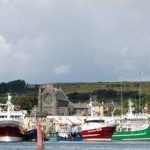Tag Archives: Gulf of Maine
A New England story goes Australian – Fishing industries under pressure
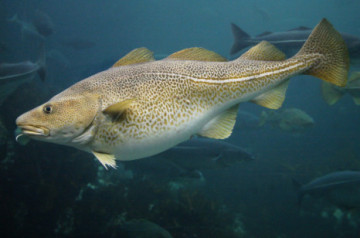 The cod isn’t just a fish to David Goethel. It’s his identity, his ticket to middle class life, his link to a historic industry. “I paid for my education, my wife’s education, my house, my kids’ education; my slice of America was paid for on cod,” said Goethel, a 30-year veteran of waters that once teemed with New England’s signature fish. But on a chilly, windy Saturday in April, after 12 hours out in the Gulf of Maine, he has caught exactly two cod, and he feels far removed from the 1990s, when he could catch 2,000 pounds in a day. The US fishing fleet has dwindled from more than 120,000 vessels in 1996 to about 75,000 today, the Coast Guard says. For the fishermen of the northeastern US – not all of whom accept the scientific consensus on climate change, and many of whom bristle at government regulations stemming from it – whether to stick with fishing, adapt to the changing ocean or leave the business is a constant worry. Robert Bradfield was one of the East Coast’s most endangered species, a Rhode Island lobsterman, until he pulled his traps out of the water for the last time about a decade ago. Read the rest here 09:30
The cod isn’t just a fish to David Goethel. It’s his identity, his ticket to middle class life, his link to a historic industry. “I paid for my education, my wife’s education, my house, my kids’ education; my slice of America was paid for on cod,” said Goethel, a 30-year veteran of waters that once teemed with New England’s signature fish. But on a chilly, windy Saturday in April, after 12 hours out in the Gulf of Maine, he has caught exactly two cod, and he feels far removed from the 1990s, when he could catch 2,000 pounds in a day. The US fishing fleet has dwindled from more than 120,000 vessels in 1996 to about 75,000 today, the Coast Guard says. For the fishermen of the northeastern US – not all of whom accept the scientific consensus on climate change, and many of whom bristle at government regulations stemming from it – whether to stick with fishing, adapt to the changing ocean or leave the business is a constant worry. Robert Bradfield was one of the East Coast’s most endangered species, a Rhode Island lobsterman, until he pulled his traps out of the water for the last time about a decade ago. Read the rest here 09:30
The Wild Blue Mussel is disappearing from the Gulf of Maine
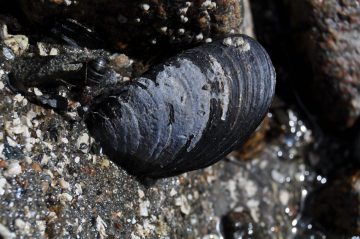 New England is running out of mussels. The Gulf of Maine’s once strong population of wild blue mussels is disappearing, scientists say. A study led by marine ecologists at the University of California at Irvine found the numbers along the gulf coastline have declined by more than 60 percent over the last 40 years. Once covering as much as two-thirds of the gulf’s intertidal zone, mussels now cover less than 15 percent. The Sorte study focused on 20 sites along the gulf, using historical data to compare today’s mussel populations to those of the past. She said the decline of mussels isn’t due to just one factor — warming ocean water, increases in human harvesting and the introduction of new predatory invasive species all appear to play a role. Read the story here 15:40
New England is running out of mussels. The Gulf of Maine’s once strong population of wild blue mussels is disappearing, scientists say. A study led by marine ecologists at the University of California at Irvine found the numbers along the gulf coastline have declined by more than 60 percent over the last 40 years. Once covering as much as two-thirds of the gulf’s intertidal zone, mussels now cover less than 15 percent. The Sorte study focused on 20 sites along the gulf, using historical data to compare today’s mussel populations to those of the past. She said the decline of mussels isn’t due to just one factor — warming ocean water, increases in human harvesting and the introduction of new predatory invasive species all appear to play a role. Read the story here 15:40
Bait Relief! Maine Pogy fishery reopens with strict new rules
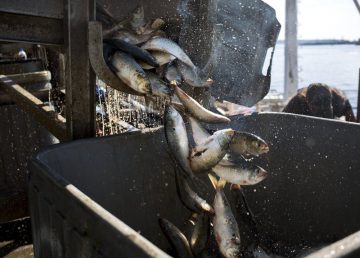 Maine made bait fishermen and lobstermen happy Monday when it reopened its pogy fishery after concluding there is still enough menhaden left in the Gulf of Maine to keep the population healthy. Those who hunt for nearshore schools of the flat, oily-fleshed silver fish – the second most popular lobster bait in Maine after herring – must follow strict new rules to prevent unusual damage or imminent depletion of the Atlantic menhaden. If they limit their fishing days to three and their catch to no more than 120,000 pounds a week, Maine fishermen can use up the remaining 2.3 million-pound quota allotted to Maine, Rhode Island and New York during a so-called “episodic” fishing event, when pogies are deemed unusually plentiful in New England waters. Read the rest here 08:08
Maine made bait fishermen and lobstermen happy Monday when it reopened its pogy fishery after concluding there is still enough menhaden left in the Gulf of Maine to keep the population healthy. Those who hunt for nearshore schools of the flat, oily-fleshed silver fish – the second most popular lobster bait in Maine after herring – must follow strict new rules to prevent unusual damage or imminent depletion of the Atlantic menhaden. If they limit their fishing days to three and their catch to no more than 120,000 pounds a week, Maine fishermen can use up the remaining 2.3 million-pound quota allotted to Maine, Rhode Island and New York during a so-called “episodic” fishing event, when pogies are deemed unusually plentiful in New England waters. Read the rest here 08:08
Why Green Crabs Are Invading the East Coast
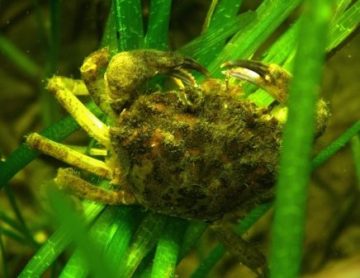 In the Gulf of Maine, as elsewhere in the world, many species are feeling the pressure brought on by climate change. A changing environment makes them more susceptible to one existential threat: invasive species. This, in turn, is having a huge impact on the local fishing industry that employs tens of thousands of people in the area, and provides seafood to the local restaurants that Maine is famous for. In short, the health of the Maine economy largely depends on the health of the Gulf of Maine, and the marine species that have made it their home. But invasive species like green crabs are coming in and wreaking havoc. Foreign species are defined as invasive when they cause the displacement of an endemic one. In the Gulf of Maine, that includes eelgrass, blue mussels, oysters, and many other types of shellfish. Invaders disrupt the trophic hierarchy,, Read the story here 15:35
In the Gulf of Maine, as elsewhere in the world, many species are feeling the pressure brought on by climate change. A changing environment makes them more susceptible to one existential threat: invasive species. This, in turn, is having a huge impact on the local fishing industry that employs tens of thousands of people in the area, and provides seafood to the local restaurants that Maine is famous for. In short, the health of the Maine economy largely depends on the health of the Gulf of Maine, and the marine species that have made it their home. But invasive species like green crabs are coming in and wreaking havoc. Foreign species are defined as invasive when they cause the displacement of an endemic one. In the Gulf of Maine, that includes eelgrass, blue mussels, oysters, and many other types of shellfish. Invaders disrupt the trophic hierarchy,, Read the story here 15:35
Maine fishermen testing a ‘game-changer’ for protected cod in the Gulf of Maine
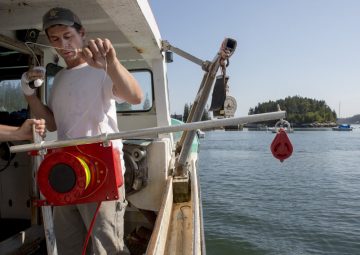 Like many Maine fishermen, Bryan Kelley faces a dilemma as he looks to diversify beyond the lobster that account for the bulk of his catch. To target pollock, which are relatively common in the Gulf of Maine, he has to fish in the same areas frequented by cod, a type of groundfish protected through strict federal catch limits. “We literally have to stay away from the codfish,” Kelley said while standing on his 40-foot boat moored in the Five Islands harbor of Georgetown. “I could fill this with codfish if I wanted to, but that wouldn’t help anybody in this sector and that is not why we are out here.” To help him catch the groundfish he wants and avoid the species he doesn’t, Kelley has begun experimenting with a contraption akin to a conventional fishing reel on steroids and with an electronic brain. The “automatic jigging machines” loaned to Kelley and a handful of other fishermen by The Nature Conservancy allow them to more accurately target the water column where pollock hang out and stay off the bottom where cod lurk. Read the rest here 07:49
Like many Maine fishermen, Bryan Kelley faces a dilemma as he looks to diversify beyond the lobster that account for the bulk of his catch. To target pollock, which are relatively common in the Gulf of Maine, he has to fish in the same areas frequented by cod, a type of groundfish protected through strict federal catch limits. “We literally have to stay away from the codfish,” Kelley said while standing on his 40-foot boat moored in the Five Islands harbor of Georgetown. “I could fill this with codfish if I wanted to, but that wouldn’t help anybody in this sector and that is not why we are out here.” To help him catch the groundfish he wants and avoid the species he doesn’t, Kelley has begun experimenting with a contraption akin to a conventional fishing reel on steroids and with an electronic brain. The “automatic jigging machines” loaned to Kelley and a handful of other fishermen by The Nature Conservancy allow them to more accurately target the water column where pollock hang out and stay off the bottom where cod lurk. Read the rest here 07:49A comprehensive article about Massachusetts DMF Industry-Based Survey underway in Gulf of Maine
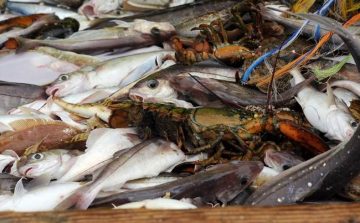 Massachusetts received more than $21 million in federal fisheries disaster aid, most of which was distributed to fishermen. But the state kept some for research projects, including $400,000 for an eight month Industry-Based Survey of random tows throughout the Gulf of Maine, from Cape Cod Bay up to Portland, Maine, focusing on cod, but counting and cataloging the fish and other species they catch. The state survey is part of Gov. Charlie Baker’s promise to help fishermen answer some of the key questions plaguing fishery management, Beaton said. Fishermen contend they are seeing a lot of cod in the Gulf of Maine, but their observations don’t match NOAA stock assessments that show historically low populations. The disconnect, fishermen say, results from the federal government using a vessel and net that have had trouble catching cod and performing surveys in the wrong places at the wrong time of year. The state survey will be more intensive than the federal effort, with approximately 400 tows in the Gulf of Maine over eight months compared with NOAA’s two-month research cruise with approximately 800 trawl locations from North Carolina up over the Canadian maritime border. Read the article here 09:50
Massachusetts received more than $21 million in federal fisheries disaster aid, most of which was distributed to fishermen. But the state kept some for research projects, including $400,000 for an eight month Industry-Based Survey of random tows throughout the Gulf of Maine, from Cape Cod Bay up to Portland, Maine, focusing on cod, but counting and cataloging the fish and other species they catch. The state survey is part of Gov. Charlie Baker’s promise to help fishermen answer some of the key questions plaguing fishery management, Beaton said. Fishermen contend they are seeing a lot of cod in the Gulf of Maine, but their observations don’t match NOAA stock assessments that show historically low populations. The disconnect, fishermen say, results from the federal government using a vessel and net that have had trouble catching cod and performing surveys in the wrong places at the wrong time of year. The state survey will be more intensive than the federal effort, with approximately 400 tows in the Gulf of Maine over eight months compared with NOAA’s two-month research cruise with approximately 800 trawl locations from North Carolina up over the Canadian maritime border. Read the article here 09:50
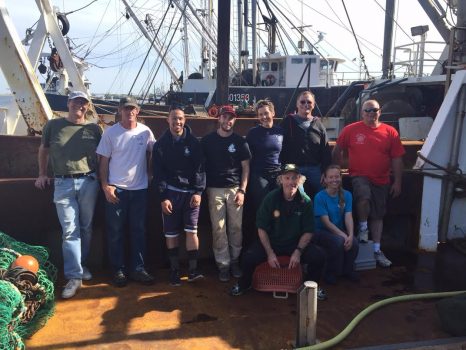
Gloucester – Fishermen, scientists to assess stock
The most incendiary divide between groundfishermen and fishing regulators in the past two years has been the discrepancy between what NOAA Fisheries says its stock assessments show and what fishermen are seeing on the water. The groundfish assessments by the National Oceanic and Atmospheric Administration — particularly for the iconic Gulf of Maine cod stock and certain flounders — have been uniformly dire, leading to the virtual shuttering of cod fishing in the Gulf of Maine and scant quotas for other species. Fishermen — including commercial groundfishermen, charter captains and even lobstermen — paint a very different portrait of what they are seeing on a daily basis: cod, cod everywhere, and not a one they can catch. On June 20, the city’s Economic Development and Industrial Corporation and fishing stakeholders will host a presentation by a team of University of Massachusetts scientists on their current findings and methodology for fish population counting in the Gulf of Maine. Read the rest here 10:09
Scallop fishermen poised for fight over shellfish, fishermen and regulators to meet Wednesday
Scallop fishing has increased dramatically off some parts of New England recently, and 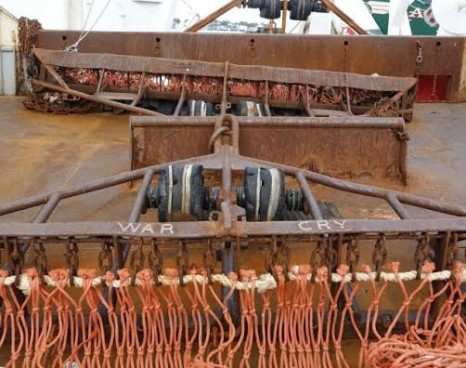 will soon meet to discuss how to avoid overexploiting the valuable shellfish. The concern over scallop fishing centers on the northern Gulf of Maine, a management area that stretches roughly from the waters off of Boston to the Canadian border. Scallop grounds off of northern Massachusetts have been especially fertile, prompting increased fishing in that area. The New England Fishery Management Council, a regulatory arm of the federal government, will hold a public meeting about the issue Wednesday (links here)and decide how to proceed. Alex Todd, a Maine-based fisherman who fishes off of Gloucester, Massachusetts, said he and others feel the rules are not equal. Read the rest here 11:46
will soon meet to discuss how to avoid overexploiting the valuable shellfish. The concern over scallop fishing centers on the northern Gulf of Maine, a management area that stretches roughly from the waters off of Boston to the Canadian border. Scallop grounds off of northern Massachusetts have been especially fertile, prompting increased fishing in that area. The New England Fishery Management Council, a regulatory arm of the federal government, will hold a public meeting about the issue Wednesday (links here)and decide how to proceed. Alex Todd, a Maine-based fisherman who fishes off of Gloucester, Massachusetts, said he and others feel the rules are not equal. Read the rest here 11:46
The Gulf of Maine Research Institute’s forecast could be affected by next week’s anticipated cold snap.
 An early June start to this year’s lobster season appears less likely in the latest forecast by researchers, but water temperatures in the Gulf of Maine still favor a “very early” start by June 19 or so. Scientists at the Gulf of Maine Research Institute in Portland put the odds of a very early start to the season – meaning two to three weeks before the traditional early July start – at 62 percent in the latest update of the forecast, issued Thursday. Read the rest, Click here 11:28
An early June start to this year’s lobster season appears less likely in the latest forecast by researchers, but water temperatures in the Gulf of Maine still favor a “very early” start by June 19 or so. Scientists at the Gulf of Maine Research Institute in Portland put the odds of a very early start to the season – meaning two to three weeks before the traditional early July start – at 62 percent in the latest update of the forecast, issued Thursday. Read the rest, Click here 11:28
Opinion: Cashes Ledge decision a victory for open government
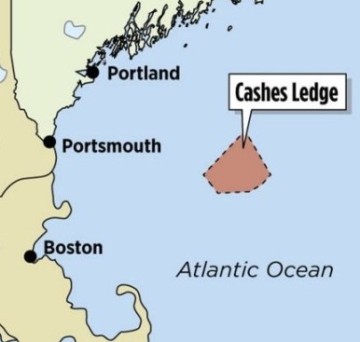 The decision by the Obama administration to pass on a proposal to make a large swath of the Gulf of Maine a national monument is not only a victory for fishermen. It’s also a win for those who favor open government. News came late last week that the administration would not, in fact, use the federal Antiquities Act to make the area around Cashes Ledge a permanent “maritime national monument” by executive decree. The environmental lobby is not abandoning its efforts. Read the rest here 07:49
The decision by the Obama administration to pass on a proposal to make a large swath of the Gulf of Maine a national monument is not only a victory for fishermen. It’s also a win for those who favor open government. News came late last week that the administration would not, in fact, use the federal Antiquities Act to make the area around Cashes Ledge a permanent “maritime national monument” by executive decree. The environmental lobby is not abandoning its efforts. Read the rest here 07:49
Gulf of Maine Research Institute says lobster season will likely start around June 19.
 An updated forecast points to an even stronger likelihood that Maine’s lobster season is going to get off to a very early start. The forecast from the Gulf of Maine Research Institute, updated Thursday, said there’s a 47 percent chance of an “extremely early start,” defined as beginning as early as June 12. The lobstering season typically kicks into high gear after July 4. A “very early start,” defined as beginning around June 19, has a likelihood of 50 percent, the institute said, and an “early start” of around June 26 has a likelihood of 3 percent. The institute said there’s virtually no chance of a normal or late start to the season for Maine’s most valuable fishery. Read the rest here 17:38
An updated forecast points to an even stronger likelihood that Maine’s lobster season is going to get off to a very early start. The forecast from the Gulf of Maine Research Institute, updated Thursday, said there’s a 47 percent chance of an “extremely early start,” defined as beginning as early as June 12. The lobstering season typically kicks into high gear after July 4. A “very early start,” defined as beginning around June 19, has a likelihood of 50 percent, the institute said, and an “early start” of around June 26 has a likelihood of 3 percent. The institute said there’s virtually no chance of a normal or late start to the season for Maine’s most valuable fishery. Read the rest here 17:38
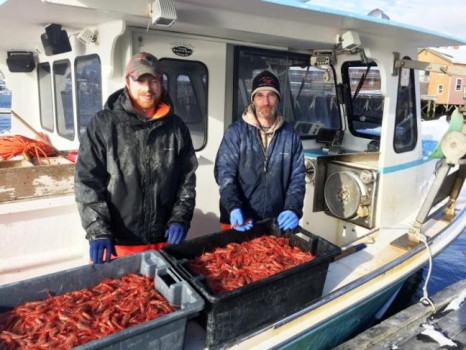
Maine shrimp – get ’em while they’re hot!
Thanks to a study being conducted by the Atlantic States Marine Fisheries Commission (ASMFC) and the states of Maine, New Hampshire and Massachusetts, four trawlers and two trappers have been selected to collect samples of northern shrimp from the Gulf of Maine. Each participating trawler is required to conduct five research trips in one region, and is being compensated $500 per trip. Each would be allowed to sell up to 1,800 pounds of shrimp per trip. Good article! Read the article here 17:30
Maine lobster industry wary as warm waters suggest repeat of disastrous 2012 season
 For those in the lobster industry, any sign of a return to the conditions of 2012 is cause for high anxiety. Researchers say the industry needs to be prepared for that possibility because warming trends are laying the groundwork for a potential repeat of the disastrous season of four years ago. “We learned a hard lesson in 2012,” said Patrice McCarron, executive director of the Maine Lobstermen’s Association. Because of warm waters in the Gulf of Maine, peak harvesting started in May that year, weeks ahead of schedule. The catch jumped more than 20 percent, from 104 million pounds in 2011 to 127 million pounds in 2012. The shedding season,,, Read the article here 10:29
For those in the lobster industry, any sign of a return to the conditions of 2012 is cause for high anxiety. Researchers say the industry needs to be prepared for that possibility because warming trends are laying the groundwork for a potential repeat of the disastrous season of four years ago. “We learned a hard lesson in 2012,” said Patrice McCarron, executive director of the Maine Lobstermen’s Association. Because of warm waters in the Gulf of Maine, peak harvesting started in May that year, weeks ahead of schedule. The catch jumped more than 20 percent, from 104 million pounds in 2011 to 127 million pounds in 2012. The shedding season,,, Read the article here 10:29
Environmentalists, Fishermen At Odds Over Turning Cashes Ledge Into National Monument
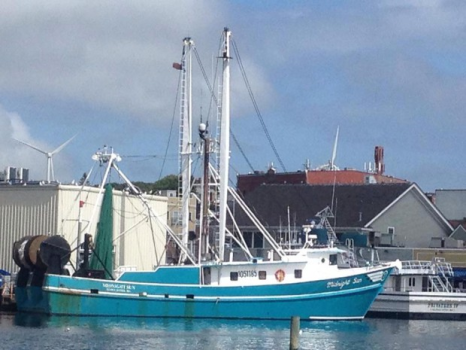 As some New England fishermen struggle under intense quota cuts, the industry is fearing another political move that could prove to have devastating consequences. There is an effort to designate Cashes Ledge — a historically important fishing area — as a national marine monument. This would require a presidential order and would effectively close the area to all commercial activity. About 80 miles off the coast of Cape Ann, a cold-water kelp forest grows from the tip of a ridge that rises from the ocean floor known as Cashes Ledge. Audio, Read the rest here 17:12
As some New England fishermen struggle under intense quota cuts, the industry is fearing another political move that could prove to have devastating consequences. There is an effort to designate Cashes Ledge — a historically important fishing area — as a national marine monument. This would require a presidential order and would effectively close the area to all commercial activity. About 80 miles off the coast of Cape Ann, a cold-water kelp forest grows from the tip of a ridge that rises from the ocean floor known as Cashes Ledge. Audio, Read the rest here 17:12
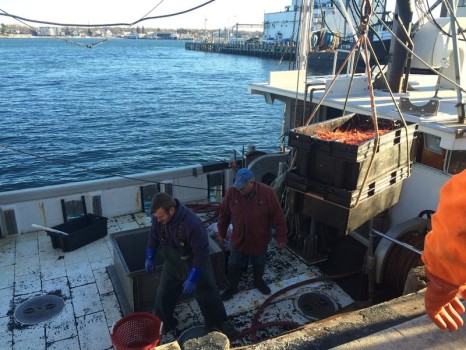
Maine Shrimp Hitting Market Thanks to Spawning Study
Despite a moratorium on the northern Maine shrimp fishing season for the third consecutive year, a few wholesale buyers, restaurants, and markets could have some Maine shrimp on their hands — and plates — this winter, due to a scientific study currently underway throughout the state.,, As part of the program, four shrimp trawlers and two trappers are collecting northern shrimp samples for biologists until mid-April, in order to study the timing of the egg hatch and the size, gender and developmental stage of the shrimp. Those shrimp not used for the sample are allowed to be sold. The sampling program allows participating fishermen to land a total of just over 48,500 pounds of shrimp from the Gulf of Maine. Read the post here 09:04
White House, Greens target Atlantic fishing grounds
 Fishermen and seafood-dependent communities in New England are battening down the hatches, fearing that an Obama administration move to create a giant Atlantic Marine Monument will spell the end to their way of life. Led by Earthjustice, the Conservation Law Center, Natural Resources Defense Council, National Geographic Society, and the Pew Charitable Trust, environmentalists are urging the White House to use the 1906 Antiquities Act to designate a 6,000-square-mile area in the and off the coast of Massachusetts as a National Monument. Read the rest here 09:25
Fishermen and seafood-dependent communities in New England are battening down the hatches, fearing that an Obama administration move to create a giant Atlantic Marine Monument will spell the end to their way of life. Led by Earthjustice, the Conservation Law Center, Natural Resources Defense Council, National Geographic Society, and the Pew Charitable Trust, environmentalists are urging the White House to use the 1906 Antiquities Act to designate a 6,000-square-mile area in the and off the coast of Massachusetts as a National Monument. Read the rest here 09:25
Gulf of Maine lobster stock at an all-time high
 A recent lobster stock assessment shows the population of the state’s famous bottom-dwelling crustacean at record highs in the Gulf of Maine. Through data collected by fishery-dependent and fishery-independent sources, the stock assessment gives fishermen and scientists a picture of the condition of the economically important stock. According to the Atlantic States Marine Fisheries Commission, the 2015 benchmark stock assessment for lobsters shows the stock of crustaceans in the Gulf of Maine and Georges Bank is not depleted and overfishing is not occurring. However, the situation for the stock in southern New England is far less clear,,, Read the article here 12:52
A recent lobster stock assessment shows the population of the state’s famous bottom-dwelling crustacean at record highs in the Gulf of Maine. Through data collected by fishery-dependent and fishery-independent sources, the stock assessment gives fishermen and scientists a picture of the condition of the economically important stock. According to the Atlantic States Marine Fisheries Commission, the 2015 benchmark stock assessment for lobsters shows the stock of crustaceans in the Gulf of Maine and Georges Bank is not depleted and overfishing is not occurring. However, the situation for the stock in southern New England is far less clear,,, Read the article here 12:52
New England States prepare to review new rules for herring fishery
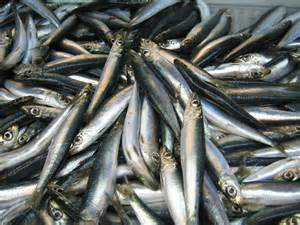 The new year will soon be here, and with it comes a new round of significant changes to the rules governing the herring fishery. Next week, the Department of Marine Resources will hold a public hearing on what is known as “Draft Amendment 3 to the Interstate Management Plan for Atlantic Herring.” Hearings are also scheduled in New Hampshire, Massachusetts and Rhode Island. According to the ASMFC, the new rules would affect the inshore Gulf of Maine — called Area 1A — herring fishery to reflect changes in both the herring resource and the fishery itself. Read the article here 08:30
The new year will soon be here, and with it comes a new round of significant changes to the rules governing the herring fishery. Next week, the Department of Marine Resources will hold a public hearing on what is known as “Draft Amendment 3 to the Interstate Management Plan for Atlantic Herring.” Hearings are also scheduled in New Hampshire, Massachusetts and Rhode Island. According to the ASMFC, the new rules would affect the inshore Gulf of Maine — called Area 1A — herring fishery to reflect changes in both the herring resource and the fishery itself. Read the article here 08:30
New Study: Scientists unravel whale entanglement damage
 Scientists from the Woods Hole Oceanographic Institution have released a new study documenting how much damage entanglements in fishing gear does to North Atlantic right whales — one of the most endangered of all the large whale species. Their migratory routes take them through some of the busiest commercial fishing areas along the East Coast of the United States — including the Gulf of Maine — and into . According to the institution scientists, entanglements with fishing gear represent the leading cause of death for endangered whales. Read the article here, 18:32
Scientists from the Woods Hole Oceanographic Institution have released a new study documenting how much damage entanglements in fishing gear does to North Atlantic right whales — one of the most endangered of all the large whale species. Their migratory routes take them through some of the busiest commercial fishing areas along the East Coast of the United States — including the Gulf of Maine — and into . According to the institution scientists, entanglements with fishing gear represent the leading cause of death for endangered whales. Read the article here, 18:32
HELLO!!!! Canada approves offshore oil exploration near Maine
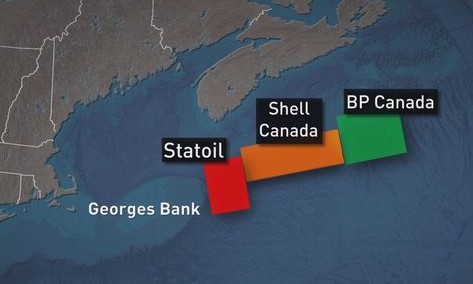 Oil drilling near Maine’s coastline is causing some concern for fishermen and environmentalists. The government of Canada has given the go-ahead to a Norweigan oil company to look for oil near where water enters the Gulf of Maine. That’s just 225 miles from Bar Harbor and right next to the important fishing ground of George’s Bank. Oil drilling off Nova Scotia has happened for decades. What makes this exploration different is its proximity to one of New England’s most important fishing grounds. Read the article here 20:18
Oil drilling near Maine’s coastline is causing some concern for fishermen and environmentalists. The government of Canada has given the go-ahead to a Norweigan oil company to look for oil near where water enters the Gulf of Maine. That’s just 225 miles from Bar Harbor and right next to the important fishing ground of George’s Bank. Oil drilling off Nova Scotia has happened for decades. What makes this exploration different is its proximity to one of New England’s most important fishing grounds. Read the article here 20:18
Warmer Gulf of Maine clobbering the cod
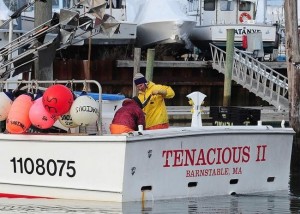 Desperate measures have been taken, cod quotas have been slashed again and again, and yet fish numbers continue to slide. Now, a new study by the Gulf of Maine Research Institute suggest the Gulf’s warming waters have led to the collapse of the fishery and recovery depends “as much on temperature as it does on fishing.”,, But if is the prime culprit, not over zealous fishermen, what more can be done on a local level? Andrew Pershing, “Our work suggests that had temperature been factored in,,,” Read the article here 09:18
Desperate measures have been taken, cod quotas have been slashed again and again, and yet fish numbers continue to slide. Now, a new study by the Gulf of Maine Research Institute suggest the Gulf’s warming waters have led to the collapse of the fishery and recovery depends “as much on temperature as it does on fishing.”,, But if is the prime culprit, not over zealous fishermen, what more can be done on a local level? Andrew Pershing, “Our work suggests that had temperature been factored in,,,” Read the article here 09:18
Oh No Canada. Nova Scotia approves oil exploration lease next to Georges Bank, entrance to Gulf of Maine
 In a move opposed by fishermen, Canadian authorities have granted the company an exploratory lease for the area 225 miles southeast of Bar Harbor and bordering on the eastern flank of Georges Bank. Environmentalists fear drilling could leave the ecologically sensitive Gulf of Maine susceptible to a catastrophic oil spill. It would be the closest that exploratory drilling has come to Maine since the early 1980s. Five wells were drilled on the U.S. side of Georges Bank in 1981 and 1982, before U.S. and Canadian moratoriums were put in place to protect the fishing grounds. Read the article here 06:27
In a move opposed by fishermen, Canadian authorities have granted the company an exploratory lease for the area 225 miles southeast of Bar Harbor and bordering on the eastern flank of Georges Bank. Environmentalists fear drilling could leave the ecologically sensitive Gulf of Maine susceptible to a catastrophic oil spill. It would be the closest that exploratory drilling has come to Maine since the early 1980s. Five wells were drilled on the U.S. side of Georges Bank in 1981 and 1982, before U.S. and Canadian moratoriums were put in place to protect the fishing grounds. Read the article here 06:27
Lobsterman discovers sea squirts on his traps
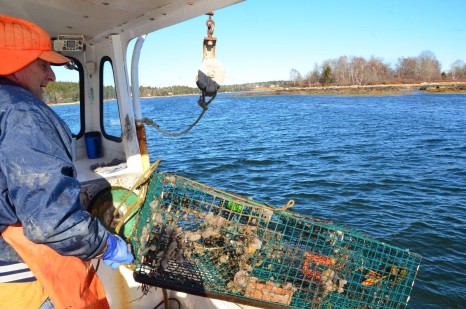 It’s no secret that the waters of the Gulf of Maine are getting warmer. Although many fishermen say that this summer the water around Downeast Maine has been colder than in recent years, according to data compiled by the Gulf of Maine Research Institute, from 2004 to 2013, water surface temperatures rose faster in the Gulf of Maine than in 99.9 percent of the global ocean. Cold or warm, this year strange critters have made themselves at home in local waters, some of them apparently settling in Downeast Maine for the first time. Read the article here 19:02
It’s no secret that the waters of the Gulf of Maine are getting warmer. Although many fishermen say that this summer the water around Downeast Maine has been colder than in recent years, according to data compiled by the Gulf of Maine Research Institute, from 2004 to 2013, water surface temperatures rose faster in the Gulf of Maine than in 99.9 percent of the global ocean. Cold or warm, this year strange critters have made themselves at home in local waters, some of them apparently settling in Downeast Maine for the first time. Read the article here 19:02
WEEKEND FOCUS: Warming waters and the Gulf of Maine’s fate
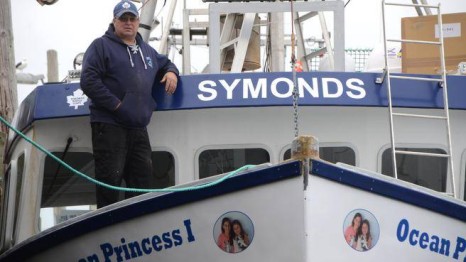 Headlines around that great body of water, cradled inside of Cape Sable Island to the north and Cape Cod in the south, screamed alarm this fall about a pending ecosystem collapse brought on by climate change. Most of those headlines linked back to a study by Andrew Pershing, chief scientific officer at the Gulf of Maine Research Institute, published in October in the journal Science. In it, Pershing attributes the non-recovery of cod stocks to the Gulf of Maine having warmed faster between 2004 and 2014 than 99 per cent of all other saltwater bodies on Earth. Read the rest here 09:38
Headlines around that great body of water, cradled inside of Cape Sable Island to the north and Cape Cod in the south, screamed alarm this fall about a pending ecosystem collapse brought on by climate change. Most of those headlines linked back to a study by Andrew Pershing, chief scientific officer at the Gulf of Maine Research Institute, published in October in the journal Science. In it, Pershing attributes the non-recovery of cod stocks to the Gulf of Maine having warmed faster between 2004 and 2014 than 99 per cent of all other saltwater bodies on Earth. Read the rest here 09:38
A fisherman’s doubt, and his love of the sea
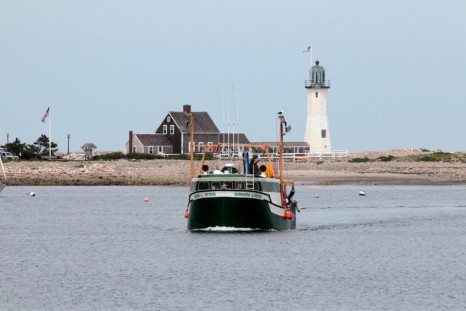 He is up before the dawn, and, a creature of steady habits, he heads for the seashore. It’s dark when Frank Mirarchi jumps into his black pickup truck, and dark still when he reaches Scituate Harbor. He parks on the town pier and stares at the ocean. But his 55-foot stern dragger is no longer moored there. Actually, the boat is there. But it’s no longer his. It was renamed last June after he sold it — a poignant punctuation point to Mirarchi’s half-century career as a commercial fisherman. Read the rest here 15:01
He is up before the dawn, and, a creature of steady habits, he heads for the seashore. It’s dark when Frank Mirarchi jumps into his black pickup truck, and dark still when he reaches Scituate Harbor. He parks on the town pier and stares at the ocean. But his 55-foot stern dragger is no longer moored there. Actually, the boat is there. But it’s no longer his. It was renamed last June after he sold it — a poignant punctuation point to Mirarchi’s half-century career as a commercial fisherman. Read the rest here 15:01
Not so fast on Atlantic marine monument – By Jon Williams
 An ongoing campaign led by large, well-funded environmental organizations is urging President Obama to use the 1906 Antiquities Act to designate parts of the Atlantic Ocean—such as Cashes Ledge in the Gulf of Maine and the New England Canyons and Seamounts—as marine National Monuments. In September, I had the privilege of testifying before House Natural Resources Committee Subcommittee on Water, Power and Oceans about the aspect of this proposal that seeks to exclude historic fisheries from the designated area. Read the rest here 18:47
An ongoing campaign led by large, well-funded environmental organizations is urging President Obama to use the 1906 Antiquities Act to designate parts of the Atlantic Ocean—such as Cashes Ledge in the Gulf of Maine and the New England Canyons and Seamounts—as marine National Monuments. In September, I had the privilege of testifying before House Natural Resources Committee Subcommittee on Water, Power and Oceans about the aspect of this proposal that seeks to exclude historic fisheries from the designated area. Read the rest here 18:47
Gulf warming study based on bad science, stakeholders say
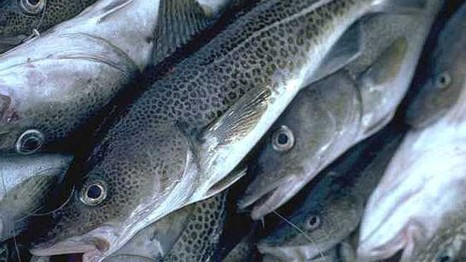 The study, performed by the Gulf of Maine Research Institute and appearing in the journal Science, concluded the Gulf of Maine’s surface water is warming more rapidly than 99.9 percent of the rest of the world’s oceans and that climate change is a contributing factor to the demise of the cod stock. “My first question was whether any part of the study started out to understand the true status of Gulf of Maine cod or if they just assumed that the data from the assessment — which we contend is consistently wrong — is fact,” said Vito Giacalone, policy director for the Gloucester-based Northeast Seafood Coalition. “I was told it was the latter.” Read the rest here 08:39
The study, performed by the Gulf of Maine Research Institute and appearing in the journal Science, concluded the Gulf of Maine’s surface water is warming more rapidly than 99.9 percent of the rest of the world’s oceans and that climate change is a contributing factor to the demise of the cod stock. “My first question was whether any part of the study started out to understand the true status of Gulf of Maine cod or if they just assumed that the data from the assessment — which we contend is consistently wrong — is fact,” said Vito Giacalone, policy director for the Gloucester-based Northeast Seafood Coalition. “I was told it was the latter.” Read the rest here 08:39
Scientists: Warming ocean factor in collapse of Gulf of Maine cod fishery
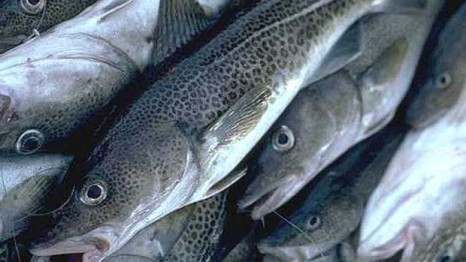 The scientists behind the Science report say the warming of the Gulf of Maine, which accelerated from 2004 to 2013, reduced cod’s capacity to rebound from fishing pressure. The report gives credence to the idea — supported by advocacy groups, fishing managers and even some fishermen — that climate change has played a role in cod’s collapse. The lead author of the study, Andrew Pershing of the Gulf of Maine Research Institute in Portland, said the gulf is warming at a rate 99 percent faster than anywhere else in the world, and as a result, too many of the fish aren’t living past age 4. Cod can live to be older than 20. Read the rest here 07:58
The scientists behind the Science report say the warming of the Gulf of Maine, which accelerated from 2004 to 2013, reduced cod’s capacity to rebound from fishing pressure. The report gives credence to the idea — supported by advocacy groups, fishing managers and even some fishermen — that climate change has played a role in cod’s collapse. The lead author of the study, Andrew Pershing of the Gulf of Maine Research Institute in Portland, said the gulf is warming at a rate 99 percent faster than anywhere else in the world, and as a result, too many of the fish aren’t living past age 4. Cod can live to be older than 20. Read the rest here 07:58
Warming waters a major factor in the collapse of New England cod, study finds
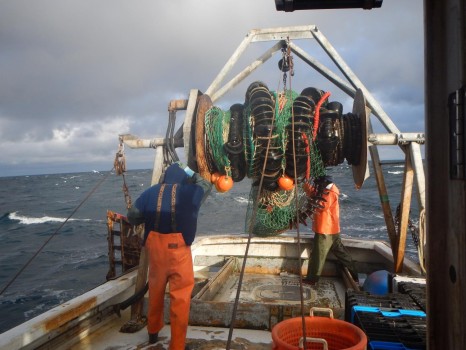 Pershing and colleagues from GMRI, the University of Maine, Stony Brook University, the Bigelow Laboratory for Ocean Sciences, and NOAA’s Earth System Research Laboratory, including the Cooperative Institute for Research in Environmental Sciences at the University of Colorado Boulder, found that increasing water temperatures reduce the number of new cod produced by spawning females. Their study also suggests that warming waters led to fewer young fish surviving to adulthood. Read the rest here 18:04
Pershing and colleagues from GMRI, the University of Maine, Stony Brook University, the Bigelow Laboratory for Ocean Sciences, and NOAA’s Earth System Research Laboratory, including the Cooperative Institute for Research in Environmental Sciences at the University of Colorado Boulder, found that increasing water temperatures reduce the number of new cod produced by spawning females. Their study also suggests that warming waters led to fewer young fish surviving to adulthood. Read the rest here 18:04






